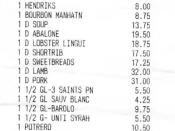"E-commerce and Sales Tax"
In today's time of economic turmoil, localities are looking to untapped resources to generate revenue. One of those untapped resources is e-commerce. What the localities want to do with e-commerce is to impose a sales tax on goods purchased over the Internet. It's one of the largest growing businesses in today's modern world. If the Internet was taxed no one would want to purchase goods over the Internet and the economy would suffer. The Internet should not be taxed.
In 1998, Congress passed the Internet Tax Freedom Act. The Act imposed a three-year prohibition on the imposition of state or local taxes on Internet access fees. The Act also prohibits state or local governments from imposing taxes that would subject buyers and sellers of electronic commerce to getting taxed twice; by the state that the purchase was made, and the state the buyer or seller resides in, if different.
The Internet Tax Freedom Act was passed to help simplify the taxation processes for more than 7,600 state and local taxing jurisdictions so that companies engaging in electronic commerce and other remote forms of commerce would not have to bear what they called an "undue burden" regarding tax collection.
There is also was a clause called the Constitutions Commerce Clause that keeps states from imposing sales tax on retailers who have no physical presence in their state. This prevents states from requiring mail order retailers to collect taxes on most catalog sales; this logic applies equally to e-commerce retailers ("Taxing").
Although these laws have been passed, states have gone on their own and imposed a sales and use tax on e-commerce. Nothing currently prevents a state such as Georgia from imposing sales taxes on its own residents on any items they purchase through mail-order catalogs...


